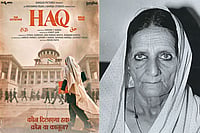A man stands in front of the lift of his Leningrad apartment all night, fully dressed in a formal suit with an attache case, as he doesn’t want to go through the ignominy of being dragged out his bed in his pyjamas by the Power to be taken to the Big House from where nobody returns, or they return with a bullet at the back of their heads. This imagery sets the tone for Julian Barnes’s new book—intriguing, grim and grey. The man is the 31-year-old Dimitri Dimitrievich Shostakovich, the top composer in Stalin’s Russia.
His masterpiece, the opera Lady Macbeth of Mtsensk, till recently both a hit with the masses as well as the unseen Power, is being seen as individualistic, formalistic and particularistic; as a Pravda article notes, “it tickled the perverted taste of the bourgeois with its fidgety, neurotic music”. The reason may be that one of Dimitri’s benefactors in the establishment, Marshal Tukhachevsky, is suspected to have hatched a plot to kill Stalin. And so Dimitri waits by the lift every night to be called for interrogation and swiftly executed, like all of the Marshal’s friends. Barnes writes that the intrinsic Russian character trait is pessimism, and leaders tried to scrub that off and make Russians into optimistic Soviets, and that’s why Soviet Russia is a contradiction in terms. Pessimism and foreboding seeps through every page, where the reader pities Dimitri for his spinelessness, yet feels for him as the powers he is bowing to are too diabolic.
But even then, was Dimitri’s whole life just hell? After all, he is the celebrated national composer, he is sent on a delegation to New York where Americans mob him (and where he is forced to denounce Stravinsky), he is honoured by France and Great Britain, he is given all the big Russian awards, he runs away with his school sweatheart, believing in free love, he adores his later wife and children, he has a few flirtations, he gets drunk with friends, he is always within Power’s proximity, he has his own chauffer-driven car and a dacha, and yet gripes all through The Noise of Time. Even after Stalin’s death, when the new supremo, Khrushchev (‘vegetarian Power’), is trying his best to undo Stalin’s depredations, when most of Shostakovich’s work is once again deemed national treasure and he is given a high office in the Party, he feels death would be better.
“It had got to the point where he despised being the person he was, on an almost daily basis. He should have died years ago,” writes Barnes. Sometimes, the reader tends to agree.
It’s true that the Stalin years were some of Russia’s darkest so far. Where Barnes makes us see the full import of it is in Dimitri’s lived-in, experiential narration of those dreaded days. For instance, he remembers the Yugoslavia-USSR soccer game of the 1952 Helsinki Olympics. The USSR loses the game 3-1, and two of the country’s soccer stars, Anatoli Bashashkin and Vsevolod Bobrov, fail to perform. One Yugoslav goal is due to Bashashkin’s blunder, and Bobrov shouts at him, writes Barnes, “Tito’s stooge”! And then, “Everyone applauded the remark, which might have been stupidly funny had not the consequences of the denunciation been well known. And had Bobrov not been the best friend of Stalin’s son Vasily. Tito’s stooge versus Bobrov the great patriot. The charade had disgusted him”.
It’s this everyday occurrences in Stalin’s Russia, the fear and shame that so many artists, sportspeople, thinkers suffered, that brings a frightening touch-and-feel quality to the despot.
But the troubling part once you have shut the book is the chilling parallels you can draw with present-day politics all over the world. The cult of personality, the centrist, authoritarian leader in many countries, the Party deciding what music the people can hear, every citizen under surveillance, what they can wear or eat, how can they practise their religion, how the masses must uphold the idea of motherland, how anything contrarian is dealt with a death blow. And all this was not in some distant dark age—Joseph Stalin was ruling just a few generations before ours.
The Word
Shostakovich’s Leningrad Symphony, completed in December ’41 during the city’s terrible siege, made its ‘fireman’ composer an emblem of resistance to Nazism.



























